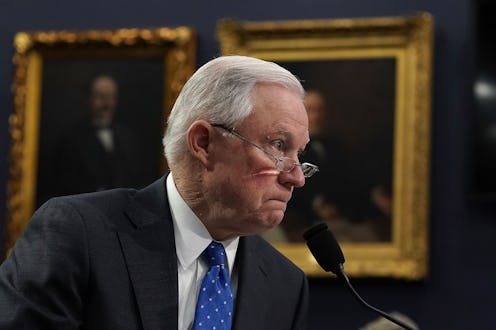News
The DOJ Deleted Its "Free Press" Section From A Manual & The Move Speaks Volumes

Recently, the United States Department of Justice (DOJ) has been making some changes to its U.S. Attorneys' Manual (USAM) — a guide which is used by federal prosecutors and other DOJ attorneys. Very notably, the Department of Justice manual's "Free Press" section disappeared during the revision process. The section's absence is certainly raising eyebrows, as it perhaps offers insight into the priorities and perspectives of Trump's Justice Department.
As BuzzFeed reported, the DOJ began revising its U.S. Attorneys' Manual in fall of last year, after Deputy Attorney General Rod Rosenstein ordered a comprehensive revision of the document. The manual was last updated in 1997. As BuzzFeed reported, lawyers use the manual as a reference guide on DOJ policies and procedures.
BuzzFeed compared previous versions of the manual with its most current version and discovered that some startling changes had been made to the document. Namely, it found that an entire subsection entitled “Need for Free Press and Public Trial" had been completely deleted. The section had previously read as follows:
Likewise, careful weight must be given in each case to the constitutional requirements of a free press and public trials as well as the right of the people in a constitutional democracy to have access to information about the conduct of law enforcement officers, prosecutors and courts, consistent with the individual rights of the accused. Further, recognition should be given to the needs of public safety, the apprehension of fugitives, and the rights of the public to be informed on matters that can affect enactment or enforcement of public laws or the development or change of public policy.
In addition to the aforementioned free press section, BuzzFeed also found that, among other topics, references to redistricting and racial gerrymandering had also been deleted. The previous version of the manual had addressed these issues in the context of discussing the DOJ's role in civil rights work.
BuzzFeed reported that the DOJ declined to comment on any specific changes made to the document. However, the DOJ's spokesperson, Ian Prior, issued a statement to the outlet describing how the manual is used and explaining the rationale behind the overhaul. As Prior noted,
[The manual is] a quick and ready reference ... [not] an exhaustive list of constitutional rights, statutory law, regulatory law, or generalized principles of our legal system ... As part of the effort to consolidate policies into a useful one-stop-shop of litigation-related documents for the Department, the Deputy Attorney General ordered a thorough, department wide review of the USAM ... The purpose of that review is to identify redundant sections and language, areas that required greater clarity, and any content that needed to be added to help Department attorneys perform core prosecutorial functions.
According to New York magazine, the free press-related changes made to the U.S. Attorneys' Manual are unlikely to significantly impact how DOJ lawyers prosecute cases. However, the changes nonetheless deliver a somewhat disquieting message about the way in which the Trump administration views the role of the press.
Indeed, this is not the first time that the administration's questionable attitude toward the press has been pointed out. As Common Dreams reported, the United States was recently ranked 45th on the Reporters Without Borders' World Press Freedom Index (which is down two spots from last year's ranking). As the outlet noted, the report cited that journalists' "right to report" in the United States was diminishing due to the Trump administration's anti-press language. Trump is known for his frequent verbal attacks on primarily liberal-leaning press outlets, often referring to them as "fake news."
Moreover, recent events have also highlighted the importance of the role of the press in holding those in power accountable for their actions. Indeed, the controversy over some of comedian Michelle Wolf's remarks at the White House Correspondents' Dinner have further shed light on the significance of maintaining an independent press. And on how a free press helps protect democratic institutions and perpetuate free speech.
Overall, while the deletion of the free press language from the USAM is probably unlikely to have significant legal implications, its elimination from the manual still speaks volumes. As New York magazine described, the decision to remove the language offers insight into what the Trump administration considers important — and promoting a free press seemingly does not fall within this category.